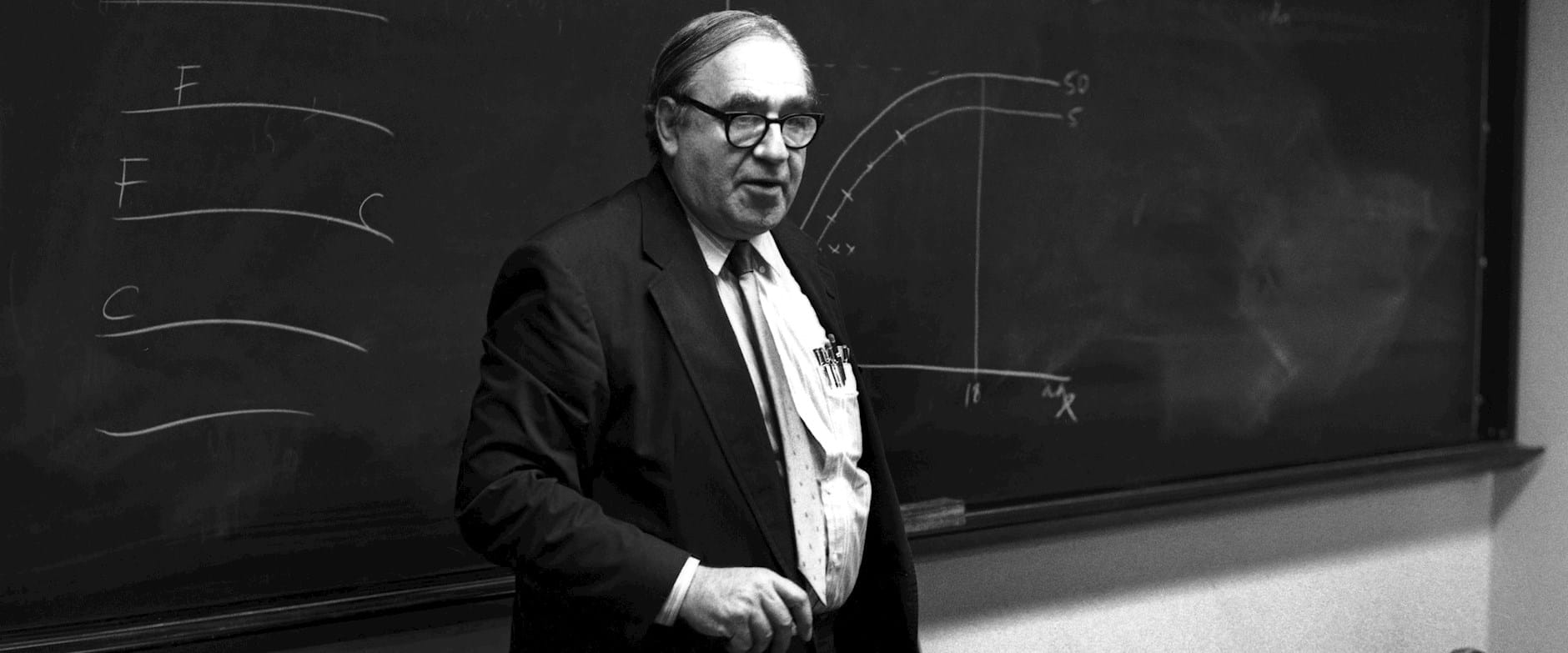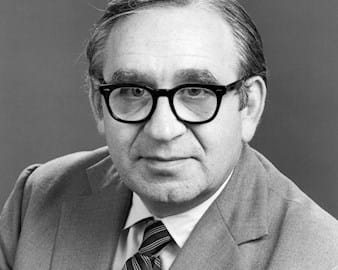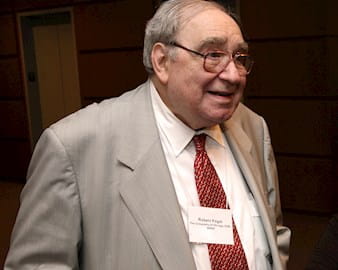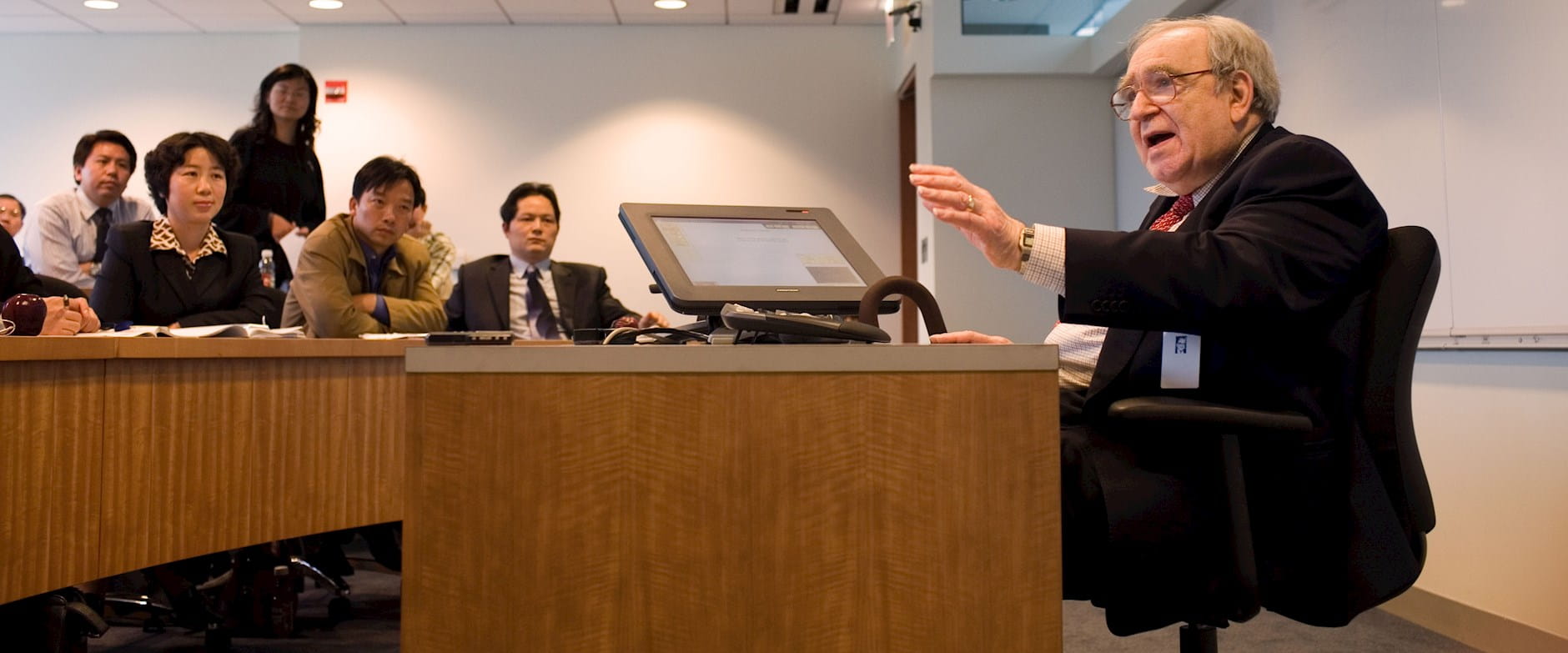
1948
Graduated from Cornell University with a major in history and a minor in economics
1948

The late Robert Fogel was an economic historian at the University of Chicago who won the Nobel Prize in Economic Sciences in 1993 for his studies of slavery in the United States, and the role railroads played in the development of the economy. He shared the 1993 Nobel Prize with Douglass C. North.
Fogel was recognized worldwide as an economic historian and scientist. Born in New York City in 1926 to Russian Jewish immigrants, he credited his parents with fostering his love of learning and his brilliant older brother for inspiring his intellectual pursuits. Fogel attended Cornell University, where his interests shifted from physics and chemistry to history and economics.
After Cornell, Fogel earned an MA at Columbia University, where he studied with George Stigler, and a PhD at Johns Hopkins University, where he did his dissertation with Simon Kuznets. In 2013, Fogel published a book about Kuznets, Political Arithmetic: Simon Kuznets and the Empirical Tradition in Economics.
Fogel was a leading advocate of the use of quantitative methods in history. His research interests included identifying socioeconomic and biomedical factors that can predict, even at an early age, morbidity, mortality, and labor force participation later in life; forecasting pension and health-care costs; and performing strategic marketing forecasting.
His 1974 book, Time on the Cross: The Economics of American Negro Slavery, written with Stanley L. Engerman, challenged the long-held assumption, by then taken as fact, that slavery was unprofitable, inefficient, and in decline in the years leading up to the Civil War. Their research found that slave farms were as productive as free farms and that the viability of slavery—as well as the economy of the antebellum South—was increasing. His four-volume Without Consent or Contract: The Rise and Fall of American Slavery continued to generate controversy.
During his career, Fogel wrote 22 books and published 90 papers in leading academic journals. Fogel taught at Chicago Booth from 1964 to 1975, and returned in 1981 after working at Harvard University. Until his death in 2013, Fogel led the Center for Population Economics at Booth.

“The older I get the more important my view of the family is. I think the most important thing I have done in my life is to raise two boys.”
—Robert W. Fogel
“Fogel’s use of counterfactual analysis of the course of events and his masterful treatment of quantitative techniques in combination with economic theory have had a substantial influence on the understanding of economic change,” the Nobel committee wrote in 1993.


Graduated from Cornell University with a major in history and a minor in economics
1948
Received an MA in economics from Columbia University, where he studied with George J. Stigler
1960
Received his PhD in economics from Johns Hopkins University
1963
Published Time on the Cross, his two-volume quantitative study of American slavery, cowritten with Stanley L. Engerman

Published Without Consent or Contract: The Rise and Fall of American Slavery, which included a moral condemnation of slavery and clarified Fogel’s earlier research

Won the Nobel Prize in Economic Sciences, sharing the award with Douglass C. North
1993
Published The Fourth Great Awakening and the Future of Egalitarianism, in which he argued that America has been moving cyclically toward greater equality
2000
Was recognized as the “Indispensable Person in Health Research” for 2006 by the Alliance for Aging Research, for his work on the economics of health and health care
2006
During the decade following World War II, when Simon Kuznets began to lay out his research agenda for studying and explaining the high, long-term rates of economic growth, he was aware of the persistent tendency of keen observers to underestimate the capacity for continuing technological advances.
How Simon Kuznets Codified Modern Economic Growth
When Robert W. Fogel passed away in June 2013, no tribute I’m aware of mentioned the years he spent teaching business ethics at Booth.
What a Nobel Laureate Taught Me about Business Ethics
Honoring the enduring legacy of Enid and Bob Fogel, the Fogel Dinner continues to support diversity at Booth.
A Welcoming Home